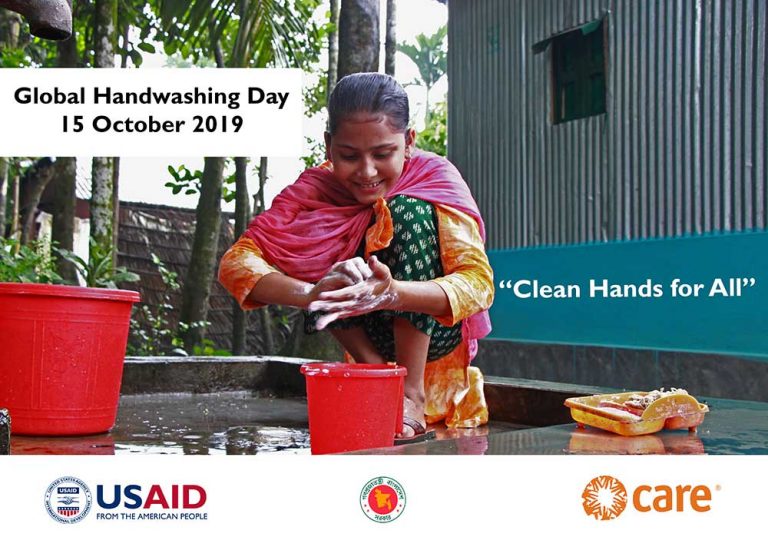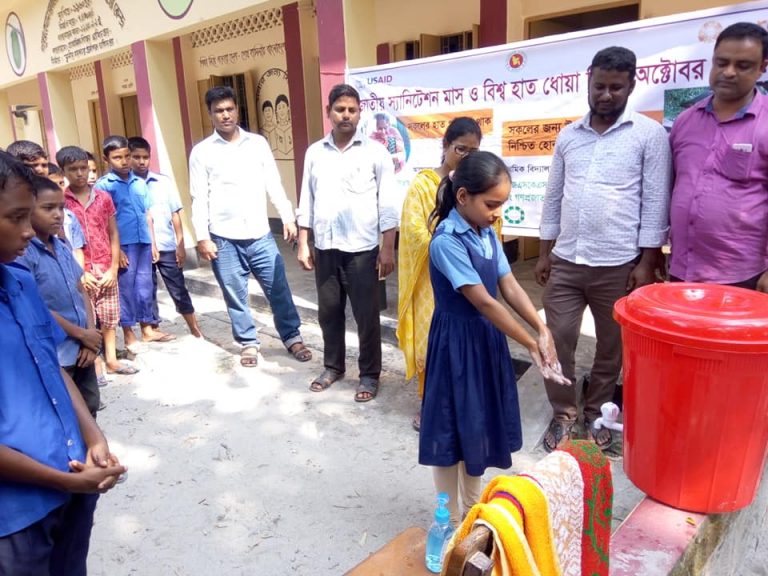Duty Station:
Email:
Tel:
Global Handwashing Day, 15 October 2019
According to a baseline survey conducted by UNICEF in 2019, in Bangladesh 1 in every 5 people do not wash their hands after using toilets and 96.2% households perceive that disease can be transmitted through dirty hands. Moreover, globally it is estimated that inadequate hand hygiene results in nearly 300,000 deaths annually, claimed by the annual research summary on the state of handwashing by Global Handwashing Partnership in 2017.
This Global Handwashing Day 2019, the theme evolves around the basic approach to achieving clean hands for all – washing with soap. Handwashing is an important part of keeping food safe, preventing diseases, and helping children grow strong. It has been proven time and again that handwashing with soap is the most cost effective way to prevent diarrhea and pneumonia. These two diseases account for almost 3.5 million children’s deaths annually, according to the publication of UNICEF on ‘The State of the World’s Children, 2008’.
CARE Bangladesh’s Strengthening Household Ability to Respond to Development Opportunities (SHOUHARDO) III funded by the United States Agency for International Development (USAID) targets eight vulnerable districts in northern Bangladesh where access to proper sanitation and hygiene is rampant. Primarily, it promotes handwashing in critical times among the ultra-poor participants from 168,521 households. A huge component of the program is dedicated to improve health, hygiene and nutrition, including Water, Sanitation and Hygiene (WASH) status of its participants especially the pregnant and breastfeeding mothers, children under five years of age and adolescent girls. SHOUHARDO III approaches WASH holistically – from massive awareness raising on key health messages to achieve optimal behavior to engaging more participants such as male counterparts of mothers and their in-laws, to coordinating efforts with the government to ensure access to public health services. The participant base sample survey (PaBSS) 2019 in SHOUHARDO III revealed that the percentage of mothers who feel it is important to wash hands at five critical times increased from 1.14 in baseline in 2016 to 15.7 in 2019 . SHOUHARDO III continues its effort to increase the practice of handwashing with soap during the five critical times including handwashing demonstration at the courtyard sessions, household visits, and Growth Monitoring and Promotion.

This year SHOUHARDO III observed the global handwashing day on October 15 with an aim to motivate and mobilize people in the community including children to improve their handwashing habits. From community to school level the celebration was so full of energy and completely interactive. Along with the GoB and DPHE, the program coordinated the observation in more than 200 government primary and high schools involving 220 students per school on average. SHOUHARDO III’s community-based groups in 947 villages also observed the day in different ways. Besides the demonstration, the observation included rally, discussion, quiz completion etc.


This year SHOUHARDO III observed the global handwashing day on October 15 with an aim to motivate and mobilize people in the community including children to improve their handwashing habits. From community to school level the celebration was so full of energy and completely interactive. Along with the GoB and DPHE, the program coordinated the observation in more than 200 government primary and high schools involving 220 students per school on average. SHOUHARDO III’s community-based groups in 947 villages also observed the day in different ways. Besides the demonstration, the observation included rally, discussion, quiz completion etc.

“Now I understand why every other month I had to visit the community clinic for my stomach pain and diarrhea. I shared what I learned about the handwashing with soap in five critical times in my school with my parents. They now make the soap always available in latrine areas so that we never miss to wash hands after using the toilet. It may seem basic, but this is crucial and should be made a habit by all.”
-Choa, Class 4, Khalapara Govt. Primary School, Mithamoine upazila, Kishoreganj district
There are five critical times during the day where washing hands with soap is important to reduce fecal-oral transmission of disease: after defecation, after cleaning a child’s bottom, before feeding a child, before eating and before preparing food or handling raw meat, fish, or poultry.


